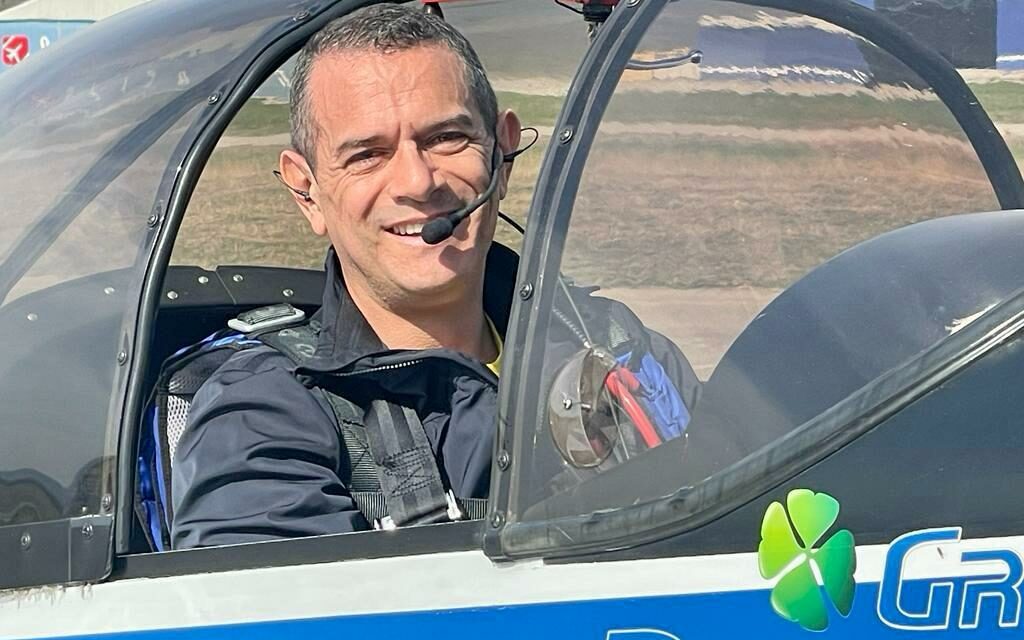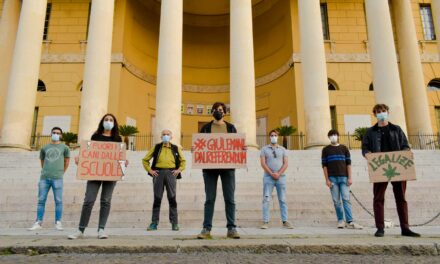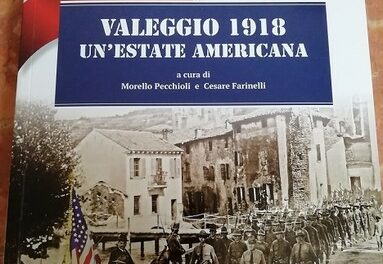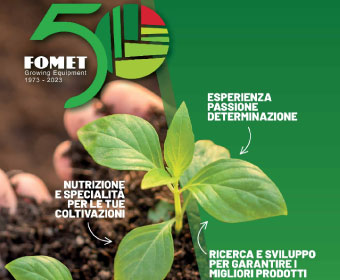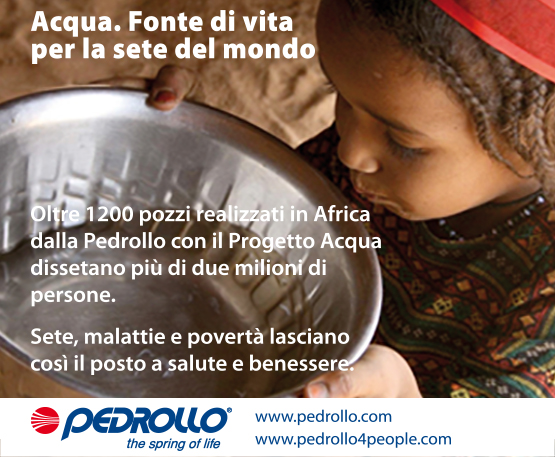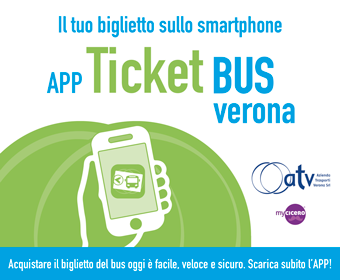A decorated officer, parachutist, diver, pilot, and instructor: this is the story of Paolo, a man who is the very embodiment of resilience
By: Samuela Piccoli
Translation by: Phillip J.W.M. Hunt
READ MORE: “Alborada. La rotativa della libertà”: l’intervista a Tarcisio Benedetti
TRANSLATION: Sulle ali della liberta (Read now)
When you meet Paolo Pocobelli for the first time you see a handsome, apparently ordinary man in
a wheelchair, but nothing could be further from the truth. Paolo lost the use of his legs at the age of
22 as the result of a parachute jump in 1994. Despite his accident, he went on to be the first
paraplegic in Italy to have all the flying licences, that is for sport, private and commercial. He
gained his licences in the United States and later converted them to Italian licences on his return.
He is also a skilled instructor who founded the association “Ali per Tutti” (Wings for All) to enable
disabled people to fly ultralights or general aircraft with structural modifications. He succeeded in
turning the flying school of Boscomantico in Verona into the first issuing licences to disabled pilots.
He has, in short, managed to turn his disability into an opportunity to do wonderful work and to be
an example and inspiration to people who have had similar misfortunes to his own. This is his
story.
A not very ordinary man’s life: the accident
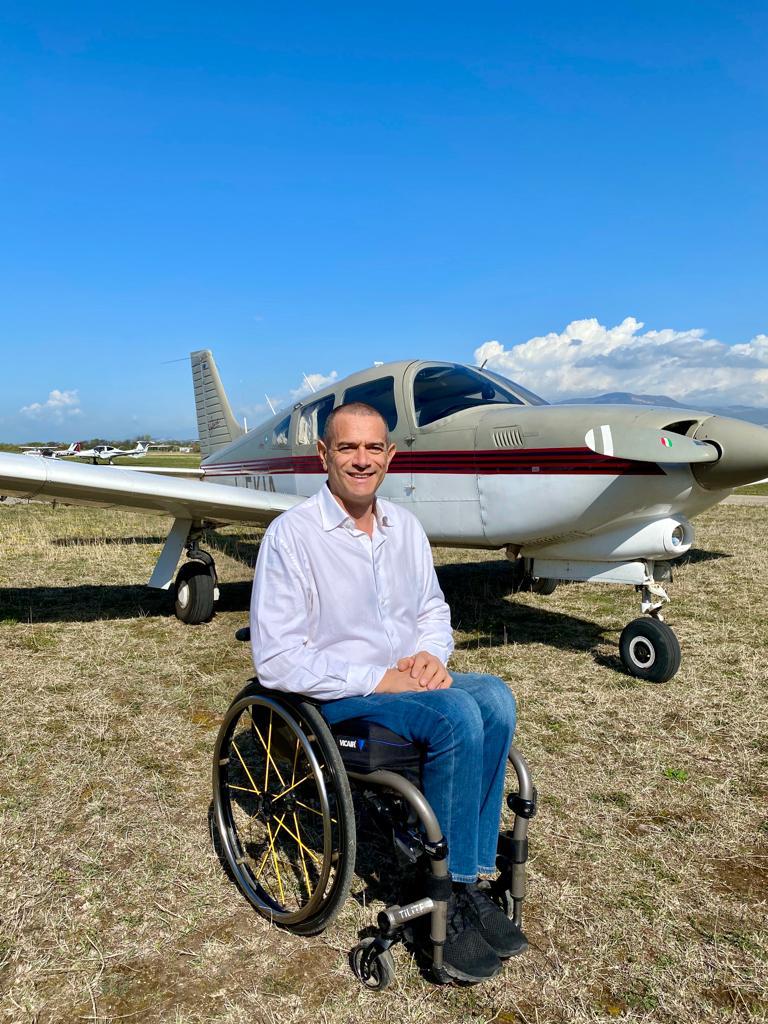
“I am 52 years old and was born in Milan into a family with four children, three sisters and myself,
and grew up with them and my mother. I’ve always been in love with everything to do with the air,
with parachutes and aeroplanes being my thing all through my adolescence and into adulthood.
While as a young person the reference point for my whole life was flying, as an adult it became that
of resilience, of getting back up when you are down, of finding the energy to go forward.
Unforeseen events happen to everyone in life, but we should avoid labelling them as small or
major as it all depends on how we experience them. Since that 5 th June 1994 when I had my
parachute accident, it has been all about getting back up again. I landed badly and broke my femur
and two vertebrae, which left me paraplegic. After a period of rehabilitation to get me back on my
feet, so to speak (he laughs), I worked for six years as a trader in a bank. It was a good position
and one that many young people would have aspired to as a career, but the job of trader was not
for me. I really didn’t like to be stuck in an office; I missed the outdoors. I began to yearn for a
change and eventually gave everything up to go and live in Egypt where I reinvented myself as a
video diver. At the age of seventeen I had obtained Padi’s Advanced diver certification. Before I
left, I studied for a whole series of technical certificates as I couldn’t be sure that they would let me
work.
Underwater video operator and pilot
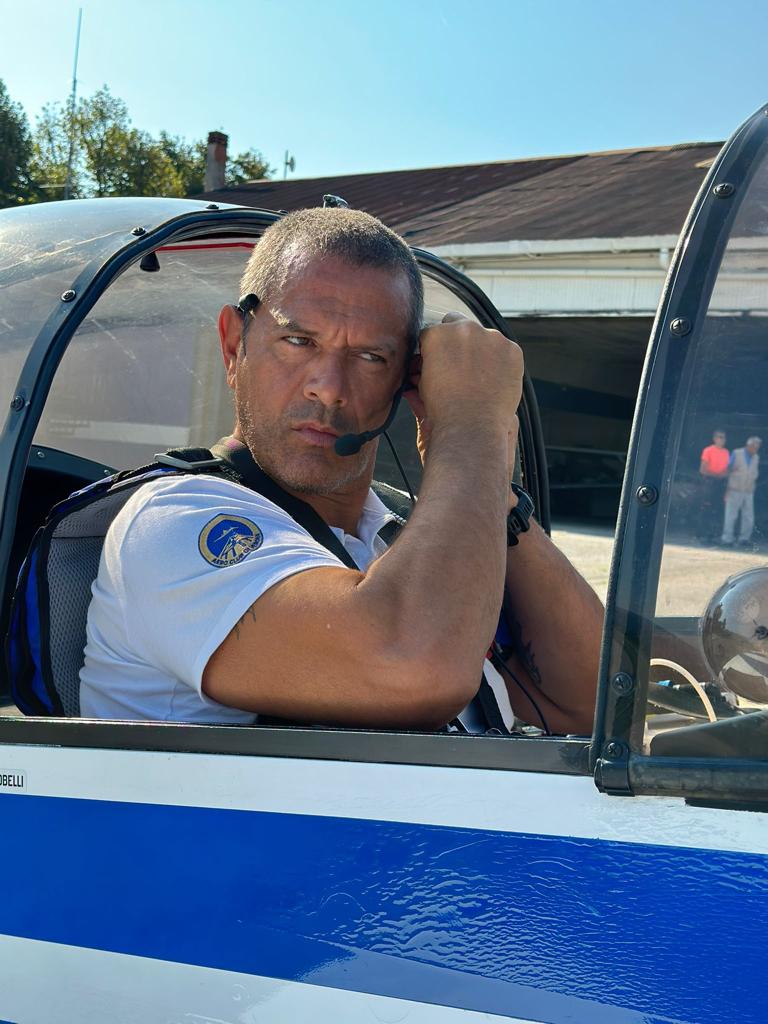
It went well for me in Egypt because I was able to work as a video camera operator and I really
enjoyed what I was doing. The call of flying was however even stronger. I returned to Europe in
2005 and stayed at home for two months, just long enough to get myself organised and then I left
again, this time for San Diego. I had found a flight school on the internet that claimed to be able to
do courses for people with disabilities. I would later find out that I was in fact their first such
student. The owners asked me what I wanted to do, and I said that I wanted to be a professional
pilot. After taking all the courses to actually become a pilot, I worked for a few years in the United
States as an instructor. I have learned two great lessons in life: to live life day by day, tackling
problems one at a time, and to be stubborn and determined when pursuing my goals. I returned to
Europe in 2009 and here I found that my licences were virtually worthless. I think I practically
invented professional disabled flying here. At the age of 38, I found myself starting over again and
went back to studying. I found by chance a flight school in Verona that no longer exists, and they
took me on. I was given the chance to convert my licences, so the applications were duly
submitted to the authorities which meticulously assessed, piece by piece, what could be approved.
So it was that I got back into the game. I began studying to be a commercial pilot in Europe. After
taking all the exams, I was offered a job here in Verona, first for this school, and then for the
Verona Aeroclub, where I still work and fly as chief instructor. In the meantime, in 2014, at the age
of 43, I became a father, and one again I learned another lesson, that the job of father is one that is
learned day by day, one step at a time. I have faced problems in life that could not exactly be
described as small, but the thing that scared me the most of all was becoming a father, as that is a
job for life.
A new project: the Handi flight around the world
Everything seemed to have got into some kind of balance. I had gone back to being a pilot, I had
had two children, Margherita and Enrico, and then in 2019 I was invited to take part in a project to
fly around the world (Handi flight around the world) to promote a positive image of disability. Initially
we were two pilots, but the project took a while to take off and in the meantime Enrico was born, so
we changed crews. I became a back-up pilot as well as the person in charge of project safety. I did
the leg from Geneva, where the project started, to Verona. Two friends of mine, Mike Lomberg and
Guillaume Feral, who helped me organise Le Bourget, were joined by a South African pilot. All
three were paraplegic pilots but during a stage of their flight, in December of 2018 Mike had a
crash and died. As safety manager I was contacted, and we all decided together to abort the
project. I had to go to Thailand however to fly one of the planes for disabled pilots to Perth, a very
long journey that was important both professionally and personally. The image of a disabled person
as a positive smiling person who could fly a plane and speak fluent English also helped the cause
and gave a message of hope to children in impoverished areas of Thailand.
An accident and a ditching in the River Adige
A little while later I was asked by a friend, who had bought an aeroplane, to do some flights
together so that he could improve his landing manoeuvres. It was an aircraft that I was very familiar
with as I had flown it in America. The fact is that on that occasion we ended up in the River Adige.
We were landing at Boscomantico airport and in the final phase there was an engine failure… well
as a matter of fact one of the engines ran out of petrol. I took control of the plane and, instead of
landing in a vineyard, I decided to land on the Adige. Neither he nor I were particularly hurt.
Unfortunately, I did break my wrist though, which was sorted out with great expertise by Professor
Corain of Borgo Roma hospital. There was a risk that I would not regain full wrist function, and for
a paraplegic living life through my hands and arms it is not hard to see that that would not be ideal,
particularly in view of the fact that I had gone to the trouble to build up a career that hadn’t even
existed before as a professional pilot. My children and my wife Sonja, who has always been there
for me, truly my rock, helped me a great deal. Years before I met her, I had conceived an aerobatic
flying project, but it had been more of dream than something really feasible since it would have
needed a six-figure investment. After I met her, we built up a family and then the Adige crash too
set up a new stage in my life that is still unfolding. When we ditched, I gave my friend Daniele a
hand to get out of the aircraft and I stayed on board as the craft sank below the waters of the
Adige. Since then, I have had to put up with being called a hero in some quarters. The reality is we
live in a world where doing the right thing, helping someone, has become the exception rather than
the rule, that it should be. I came to realise that I could perhaps help other people with an image
and the examples from my own life. I am aiming to start a new chapter, in which I will create
podcasts and publish a book.
The ‘Ali per tutti’ (Wings for All) association and a special award
from President Mattarella
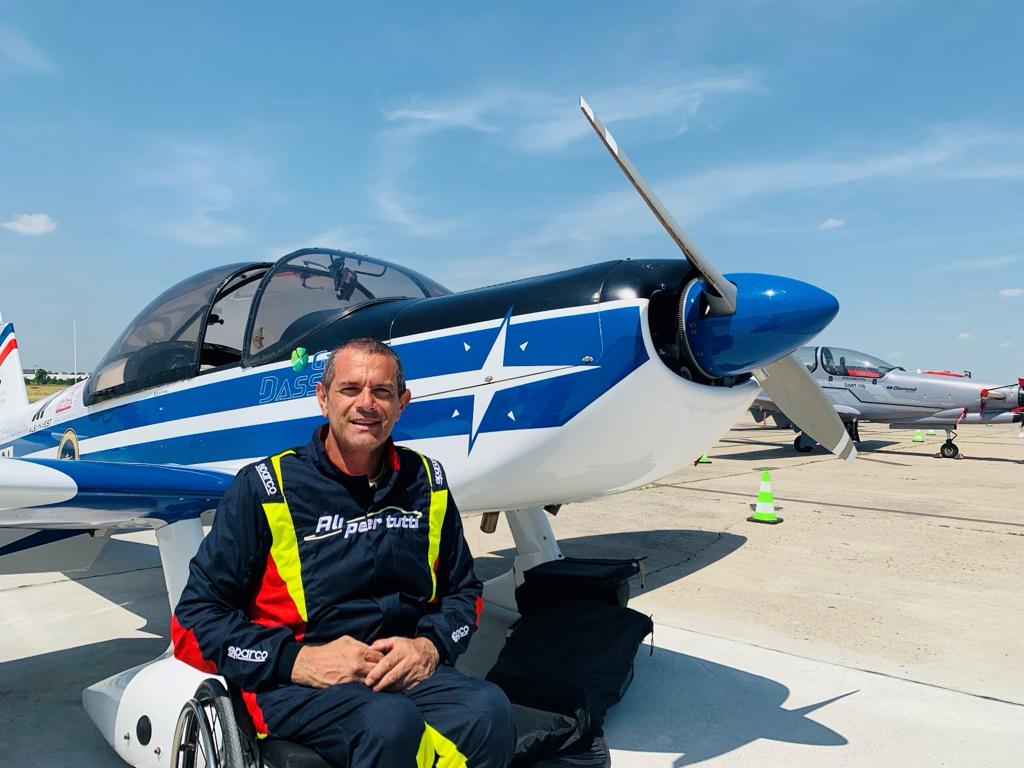
After the accident, a lovely thing happened to me, Italy’s President Mattarella heard of my story
and what I had been doing for disabled people in the world of aviation, and he decided to honour
me with the title of Officer of the Order of Merit of the Italian Republic. Now is the time to tell my
story so that it can perhaps help to encourage others to face their own problems. In 2011, while I
was working on becoming a professional pilot in Europe, I was invited to France with an aeroplane
from a French association to go to the Le Bourget international air show. This is a trade air show
as well as being one of the biggest of its kind in the world. While I was there, I was asked to take
part in the competition for the Pepite award (Prix Européen Pour l’Intégration des Travailleurs
Extraordinaires). I set out the project called “Ali per Tutti” which aimed at creating a network to put
disabled people in contact with training companies, not just flight schools, to provide the aviation
industry with professionals. “Ali per tutti” won the PEPITE award. It was the spark that initiated the
age of European professional disabled pilots. President Mattarella presented me with the award for
work on behalf of people with disabilities. Last year “Ali per tutti” got an aerobatic plane and, in
2023, I returned to Le Bourget, thanks to the support of sponsors. It is my mission now to send out
a positive message to people, and particularly the younger generation, and air shows are a
marvellous a way to do that. When children their eyes light up to see the aerial acrobatics and
when they see the pilot gets out of the aircraft, they don’t see a disabled person but a pilot in a
wheelchair. Today’s children are tomorrow’s world, and they are able to see a disability and accept
it as something quite normal. I am the only aerobatic pilot in Italy, and I am the only flight instructor
in the world in a wheelchair, it is time to bring this fact to the consciousness of many people so that
it can be an example for them’.

